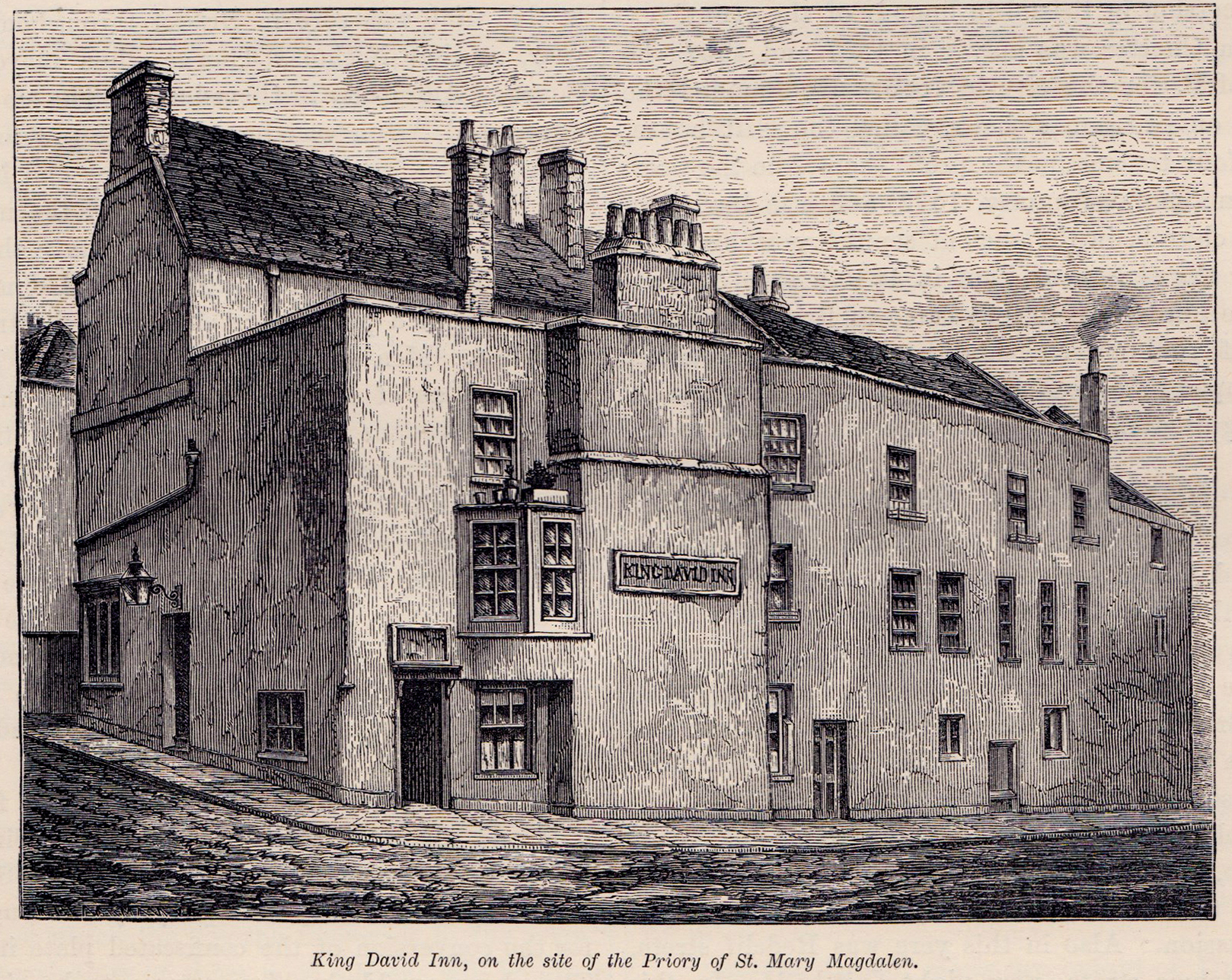
More info on this premises may be found at the Bristol Lost Pubs excellent website.
THE. KING DAVID. TO BE SOLD BY AUCTION, By Mr. WALL, At the COMMERCIAL SALE ROOM, Bristol, on SATURDAY the 28th day of May instant, at One o'clock in the afternoon, ALL that large and commodious INN, called THE KING DAVID, situate on St. Michael's Hill, in the parish of St. Michael, in this city; with the Strip, spacious Yard, and extensive Stables and Buildings belonging thereto, now and for several years past in the occupation of Mr. George White, as tenant at will. Also, all that TENEMENT, on St. Michael's Hill aforesaid, adjoining the Yard of the said Inn, and now in the occupation of Mr. William Mansfield, Baker, as tenant thereof. For a view of the Premises apply to the tenants; and for further particulars and conditions of sale to Mr:THOMAS JARMAN, Solicitor, Bristol. (From the Bristol Times and Mirror - Saturday 7 May 1814 p.1.)
George White died at the King David in April 1817 aged 44, he was buried at St. Michael's on 1 June 1817. Possibly connected to William and Charles White, pump-makers of Gloster-street (1791) and therefore perhaps to James Highman.
In the Bristol Mirror in an advertisement dated 19 Nov. 1817 "TO BE LET OR SOLD, THE KING DAVID INN, in the parish of St. Michael, in this City, with the extensive Buildings and Ground, Court-Yard and Offices thereto belonging. Also to be LET, a COACH-HOUSE and STABLE, in Horfield-lane, Bristol. Possession of either of these may be bad immediately. Apply to Mr.T. JARMAN, Solicitor, Broad-Street, Bristol."
Pigot's directory of 1825 is in error, showing "T. Highman" at the Hope and Anchor, Redcliff Hill, and Thomas Watson at the King David. Watson was bankrupt at the Hope and Anchor in Feb. 1826, and it was Highman with a J at the King David. The King David had been an Inn since at least 26 March 1702 (Bristol archives ref: 25016/1) or at least mostly converted to one by 1708. It was formerly a house with court and garden called the Lower Mandlers on the site of the old Priory of St. Mary Magdalene which was purchased by Henry Brayne and John Marsh after the dissolution around 1540.

James Highman was born around 1774 likely son of corn factor Paul Highman (1748-1818) and wife Mary of New Street, St. Philip & Jacob's, and baptised at that church on 1 June 1777. In 1822 James Highman was a plumber, water closet, and beer engine manufacturer in Gloster-lane in partnership with his sons John and William as James Highman & Sons, by 1826 he was also victualler at the King David on St. Michael's Hill. The family were the occupants the Coach & Horses, Gloster-lane, from c.1816-1822, which Mrs. Highman was offering to let in 1858. James had married Ann Bird at Bristol St. Peter on 12 Sept. 1803. James died at the Inn on 5 December 1830 aged 56, he was buried at St. Michael's on 19 Dec. On 11 Feb. 1837 the Highman's eldest son William, who had followed his father's plumbing profession, died at the King David after a long illness aged 31. On Monday 11 May 1840 a man called Thorne hung himself in one of the rooms at the Inn, the body was discovered by servant Margaret Sadler, who thought at first he was just standing by the bed. More tragedy followed that year as James Highman, Ann's youngest son, also a plumber. died on 14 August aged 25.
Mary Highman was born 1810, baptised 25 Feb. at St. George, Bristol daughter of James and Ann Highman. She married auctioneer Robert Lockley at Bristol St.Paul, Portland Square on 12 June 1827. They had children Fanny and James Henry Lockley. Robert died in 1855 at their home "The Crown" public house in Lamb Street, St. Philip & Jacob's.
Edward Willey, cabinet maker, of 46-48 St. Michael's Hill, born 3 July 1814, baptised 22 July 1817 at St. Michael's, son of Joseph and Mary married Ann Highman of the King David Inn at Long Ashton on 8 Feb 1836. Ann was the daughter of James and Ann Highman, born Gloster-lane in 1817, baptised at St. Philip & Jacob on 23 Nov. 1817. Edward's parents were cabinet makers. upholsterers and undertakers. His father died in 1834 and his mother Mary continued the firm. It seems Edward was a cabinet maker in Stokes Croft after his marriage and then lived in Upper Bristol Road, Bath in November 1836. On 24 Nov. 1836 he had a bankruptcy meeting at Wells Court House.
Ann Highman and daughter Ann Willey were living at 3 Limekiln Lane (behind the present Council house) in 1851. Edward Willey seems to vanish from the records although Ann does not state that she is widowed until 1861. Their son Edward Highman Willey, born 5 Aug. 1838, was baptised at Clapham Holy Trinity, and their abode is given as Lambeth on 26 Aug. 1838. Their next son James Highman Willey was baptised at St. Philip & Jacob on 23 Aug. 1840. Daughter Ann Highman Willey was born 1843, baptised 17 Sept. again at St. Philip & Jacob's, the abode given as Easton.
The King David in around 1839 was managed by a victualler named Matthew Pomfrey as was related in his 1854 bankruptcy along with a long chain of other places where he had gone out of business.
From about 1841 to 1858 the King David was occupied by Excise Officer Robert Adams, whose mother Mary died there on 20 Jan.1841 aged 57. Originally from Whitchurch, Devon, born around 1808, Robert had been in Bristol about 10 years before he took on the pub, moving from Bitton via Brislington. The family likely managed the pub for Ann Willey who still held the licence.
On Weds. 16 March 1859 the pub was for sale "All that Freehold well-accustomed INN & TAVERN, called The King David, with a small Shop, an excellent. Brew-house, Cellars, large Yard, Stables, Coach-houses, Slaughter-house, Sheds, &c., and also a small COTTAGE adjoining situate at ST. MICHAEL'S HILL and MAUDLIN-ST., Bristol, now in the occupation of Mrs. Lockley and Mrs. Willey, as yearly Tenants, at £70 per annum. These Premises have a very commanding frontage, are well supplied with hard and soft water and in them a large, and lucrative business has been conducted for many years past."
6 May 1861 at St. Barnabas church, by the Rev. Mr. May, James Highman Willey, second son of Mrs. Ann Willey, King David Inn, St. Michael's Hill, to Henrietta, eldest daughter of Mr. John Burrows, of Old King-street. James was a licensed victualler at Waterloo House in King Street, Bedminster, bankrupt and under liquidation in January 1873.
From Weds 11 Oct 1865 William Cates took the licence of the Swan, Temple Gate, from Francis Hillier, he relinquished the same to George Penfold on Tuesday 27 Nov. 1866. He then became a business partner and manager for Ann Willey at the King David.
William Cates was born in Bristol in 1836, baptised at St. Mary Redcliffe 1 Jan. 1837, son of George Cates, a Bedminster cabinet maker, and wife Elizabeth Ann. By 1851 the family had moved to Clifton Docks and William became a marine engineer by trade. In 1861 he can be found as engineer aboard the Steam Coaster "The Taff" under Capt. Charles Wheeler out of Bristol at Newport, Mon. On 5 January 1862 he married Ann Highman Willey, daughter of Edward and Ann Willey of the King David.
In 1868 the City of Bristol was in a state of riot owing to the election that year, which resulted in a victory for the local Liberal seats over the Conservatives. Unfortunately one of the main victims of this riotous assemblage was the King David. The rioters were largely from the working class who were most likely to be disenfranchised by proposed weak electoral reform. Those who were looked upon as the "feckless and criminal" poor to quote other commentators on the subject. The Conservatives were playing upon a split in the Liberals between those that wanted to preserve the status quo and those who wanted further reforms, the "Radicals". There had been riots in Hyde Park in London the previous year where the government were afraid to use force on the large numbers for fear of the consequences, but the rioting had spread to other towns. The minority Conserative government pushed through a set of reforms, but despite the enfranchisement of the male working classes, the Conservatives still lost the election of 1868.
From the Frome Times - Wednesday 25
November 1868 page 3: "THE “LIBERAL VICTORY” AND LIBERAL WRECKING OF
BRISTOL. The citizens of Bristol have had three clear days, since the
triumph of terrorism, to recover that comparatively quiet state of mind
necessary to enable people to look at the events of Tuesday without the
heat and passionate indignation which the scenes of violence, enacted
under orders from the election committees who returned Messrs. Morely and
Berkley, were so calculated to produce. Nevertheless, the feeling and
conviction is as strong, and if possible more founded than ever, that the
city was on the eve, through the uncontrolled excesses of a hired and
armed Radical mob, of having the Bristol Riots of 1831 acted over again,
and with more calamitous results. We say no more than know to be truth,
when we say that the authorities were under the greatest apprehension of
hearing every moment, in addition to the savage assaults committed by the
flying columns of “Terrorists,” the ruthless destruction of property and
sacking of houses, that incendiary fires had broken out in various
quarters, the police officer having been obliged to admit, in a private
conference of magistrates, that the city was at that moment virtually in
the possession of the mob. That these most serious fears were not
unfounded must be admitted by everyone who has read the report of the
cases adjudicated by the Mayor and Mr. W. Naish on Wednesday, our Radical
contemporaries having glozed over and cooked their accounts, in adroitly
prepared paragraphs, for obvious reasons.
In corroboration of what we say we say we have only to make a few extracts
from the evidence given before the magistrates, and against which nothing
worthy to be called a defence was set up; the rioters getting punishments
varying from fourteen days’ to a month’s imprisonment with hard labour:—
Richard Townley said—I keep the Rose and Crown, Horsefair. Yesterday,
about a quarter to nine o’clock, I recorded my vote for Mr. Miles. I did
not put any colours whatever in the window. After I had given vote, I saw
a lot of roughs coming right by the booths, and they stopped in front of
my house and broke my windows. I know several of the men, and shall take
out summonses as soon as I can. I saw the prisoner throw a stone at my
window.
Mr. Brice - You sustained considerable damage altogether? —A. Yes ; and
they nearly broke my leg. (Mr. Townley walked crippled, and with the aid
of a stick).
The attack on Mr. Pearson’s house Broadmead, was of the same furious
character; a person named Holly savagely assailed it with a large force of
roughs, and two young women kindly running before warned Mrs. Pearson of
the impending danger.
Mrs. Pearson—The two young women ran in to me and said, "For God’s sake
shut the door, he (the prisoner) has been into Pean-street, and got sixty
of them.” Before I could shut the door the prisoner and large number of
men came to the house. When they found they could not come in at the front
door they smashed the windows. I saw the prisoner break the windows and
strike my husband; and heard him call out to the roughs outside, "Come in
and gut the house; we will kill them, and have a fresh landlord
to-morrow.” We were in danger of our lives, and had given no provocation.
Mr. Pearson said when the mob came to the house the prisoner said to them,
“Now, you —, death or glory!” He had an immense knob-stick in his hand.
They commenced smashing the windows, and threw pieces of ginger beer
bottles (produced) towards witness’s head.
But both these outrages and many others were eclipsed by the wrecking of
the old-established inn, the King David, St. Michael’s-hill.
Mr. William Cates, part landlord with Mrs. Willey, said —About twelve
o’clock an intimation came that the town was being sacked by a gang of
between 400 and 500, and it was understood that all blue houses were to be
sacked. I at once put up the shutters, barred the gates, locked the door,
and everybody was prepared. I heard a shout, “They are coming.” The crowd
was the whole width of St. Michael’s-hill—a solid, compact body, worse
than Sepoys, coming down the hill in a swarm. All of sudden they
surrounded the whole house, and smashed every window. When the bar was
broken into, the word was given, “Now for your lives—be off;.” the wives,
children, myself, and the brewer were driven to the garret. The rioters
took possession of the bar; all the spirits were run out; cigars, tobacco,
and everything portable taken away. The place now is gutted, and is a
perfect wreck.
Mr. George Arthur Cates, brother of the last witness, said—I happened to
be in the King David when this row occurred. I, my brother, Mrs. Willey,
Mrs. Cates, her children, the prisoner, and the brewer were inside. The
mass consisted of men, all well armed with sticks. After describing the
raid on the house, witness continued:—At last we heard shouting outside,
“Now we will kill the —;” “We have got them trapped now;” and “Kill the
Blues.” Then a man commenced with an axe on the bar window; he had a blue
guernsey on. Having got the window out, he pushed himself into the bar.
Then there was a run. Mrs. Willey said, “Oh, George, save my children,”
and we all had to cut for our lives. We heard them say they would not go
until they had his life. Moul was one of the clamourers; he came up to the
gate, and was connected with the gang that had broken into the house.
Reading the above, one seems almost to have alighted on a page of the
narrative of the old Bristol riots, for which the Liberal party in this
city have again been educating the dangerous classes that crowd
our poor, and populous, and criminal quarters. Not only were large bands
of their labourers raised in the works of Radical proprietors and sent,
armed with stones, lumps of coal and bludgeons, into the city to sweep the
streets of Conservative voters and smash their houses; but the very worst
description of local roughs were also subsidized for the service, and it
only wanted arson—upon the eve of which we were more than once towards the
approach of the dark November night— to inaugurate perhaps week of such
mob saturnalia as the city knew in 1831. That the citizens are not now
mourning over the smouldering ashes of burned gaols, and bridewells, and
dwellings, and warehouses, they have to thank Providence, and not the
Radical party, who let loose the inflammable materials into our streets;
and, to carry two members, subjected to vast community of persons and an
immense amount of property to all the perils of sack, incendiarism, and
murder!..."
From the Western Daily Press -
Friday 18 December 1868 page 3: "THE CHARGE AGAINST THE BREWER OF THE KING
DAVID. At the Council House yesterday, before Mr. R. P. King and Mr C. J.
Thomas, Thomas Rowe, the brewer of the King David, St. Michael's Hill, was
charged with assaulting a boy named George Henry Townsend, on the 17th
November, by throwing a tile on him. Mr Benson appeared for the defence.
Mr Box, from the office of Messrs Brittan, appeared to prosecute. He said
that this was a case arising out of the attack on the King David on the
polling day. The prisoner was on the roof throwing down tiles upon the
people below, and one of them struck a boy named Geo. Henry Townsend, for
which the prisoner was charged before the magistrates on the following
day, but on account of the serious injury the boy had received he was
unable to appear, and the prisoner was bound over to appear when called
upon.
George Henry Townsend, 7, Barton Vale, St. Philip's, aged twelve, said: On
the polling day I was opposite the King David public-house, when a great
crowd was assembled. I was struck on the head by a tile which was thrown
from the roof. I was rendered insensible, and taken to the Infirmary,
where I remained until last Friday, and the mark upon my face is the
result of it. I could not tell whether the prisoner is the man that threw
it.
Cross-examined by Mr Benson: I do not know whether it was a brick or a
stone that was thrown at me. I was standing at the Maudlin Street entrance
to the house.
William Bartlett, sworn, said: I am a riveter. I was outside the King
David on the polling day. I saw a man with a white smock on the roof. The
prisoner is that man. I saw him fling two tiles, and immediately
afterwards I saw the boy Townsend carried away. I did not actually see the
tile strike him.
By Mr Benson: I was just below the King David. I saw a number of stones
thrown from St. Michael's Churchyard at the man on the roof. The man was
throwing towards Perry corner, in an opposite direction from where the boy
was standing.
P C. 90 deposed: I went to the King David on the morning of the polling
day. I got a ladder and went upon the roof. I did not find prisoner on the
roof, and I got in by the window. I got into a lumber room first, and
looked into another room, where there was a woman, and asked her if such a
man was there, and she said not. I went to another room, and saw the
prisoner standing behind the door. He came to me as soon as he saw me.
By Mr Benson: The house was smashed all to pieces.
This being the whole of the evidence for the prosecution, Mr Benson,
previous to calling witnesses for the defence, said the case for the
prosecution had failed miserably, as he had predicted. They had had only
one witness who spoke to throwing the tiles, and he said that the man was
throwing towards Perry Road, in a different direction from where the boy
was standing. There were a number of persons throwing stones from the
churchyard, and from the end of Maudlin Street, where the boy was
standing. There was no witness to prove that the missile which struck the
boy was thrown from the roof. Mr Benson was entering upon a history of the
attack upon the public-house, when Mr. Thomas said he did not think he
should introduce that, as it had not been mentioned in the evidence. Mr
Benson replied that he intended to call witnesses to speak to it. After a
consultation between the magistrates, Mr King said it was no use hearing
witnesses for the defence, for they were of the opinion that there was no
evidence against the defendant.
Mr Benson applied for the expenses of his witnesses.
Mr Brice said it was not customary to allow expenses under the
circumstances. It would be perfectly right to apply for expenses if the
prosecution had brought the case into court upon their own motion, but the
magistrates who heard the charge on the 18th of November thought it was a
case for further investigation, and therefore it was not a new trial.
Thomas said it was seldom that he differed from his friend Mr King, but,
in the present case, although it could not be shown that the defendant
threw the missile which struck the boy, it was evident that he had thrown
down tiles from the roof, and he might consider himself fortunate in
getting off so easily.
Mr Cates, joint occupier of the King David, complained that it was
dangerous to live in the house. They had to pay all the expenses of
witnesses and of defending themselves from those fellows, besides paying
rates and taxes, and get no protection from the police.
Mr King said that if there was any evidence brought forward they would be
willing to hear it, but it was no use calling witnesses in defence of that
man (Rowe).
Mr Cates again complained of the expense he had been put to, and the want
of protection which he felt.
Mr Thomas said it was very irregular to address the court in that manner
when his advocate was present, and had said all that was necessary. It was
only right that the father of the child, who had been injured in that way,
should seek redress.
The father of the boy said he had not prosecuted through any vindictive
feeling."
From the Western Daily Press -
Monday 3 April 1871 page 3: "NISI PRIUS COURT. SATURDAY.—Before Baron
Pigott. TRESPASS IN MAUDLIN STREET. HULBERT v. WILLEY AND ANOTHER.
Counsel for the plaintiff, Mr Norris and Mr Poole ; for the defendants,
Edlin, Q.C., and Mr Ffooks. Norris, stating the case, said that the
plaintiff was a butcher, carrying on business Christmas Street; and the
defendants were the owners of the King David Inn, in Maudlin Street, where
they carried on the business of licensed victuallers. On the 21st of
February, 1870, the plaintiff purchased same premises immediately
adjoining the King David Inn, of Mr Edward Strickland. The premises
consisted of a plot of ground, and the ruins of two old cottages fronting
Maudlin Street, and lying between the King David Inn and the Eglington
Arms Inn, and the plaintiff proposed to erect upon these premises a
dwelling-house and shop. He was about to remove his business from
Christmas Street, where he had conducted it for a considerable time, and
he had had a favourable offer for his business and the fixtures in the old
shop. The ground purchased had a frontage in Maudlin Street of about
thirty feet, and altogether the premises extended back about 80 or 100
feet, the whole forming a most desirable site for the business which he
purposed carry on there.
At the time of the purchase the piece of land in dispute was raised very
considerably above the level of the remaining portion of the property, and
also above the level of Maudlin Street. In June, 1870, he began to
excavate the ground so as to bring it to a level with the other property,
and for the purpose of erecting his business premises. He carted away five
or six cart loads or more of earth, stones, and rubbish. For some reason
he delayed his operations, and in October the defendants built a rough
wall separating one portion the property from the other. In that month the
plaintiff wished to go on with the work, and he instructed one of his men,
named Palmer, to pull down this wall. This was done, and the earth and
rubble were carted away. Then for the first time the plaintiff discovered
that the defendants had opened a door way on a portion of the land, and
their contention was that they had a right to make the doorway a means of
egress from their premises; in fact they claimed the property as their
own. The plaintiff, however, contended that the ground was conveyed to
him, and that the defendants had no right have this doorway opened.
His Lordship: Do the defendants claim more than a right way?
Mr Edlin said that the piece of land question was originally attached the
defendants' house, and it was used by the occupiers of the King David for
a long period time.
Mr Norris resumed his opening statement. On the 11th of October the
plaintiff came upon the land and saw Palmer and Cates—the latter being one
of the defendants—and then he heard that the piece of ground which he had
purchased and paid for, did not belong to him, but to Mr Cates. On the
following day he went on the premises, and saw an exhibition, to which he
was thoroughly unaccustomed. Cates and his brother-in-law had hired dozen
or more of roughs who threatened the plaintiff that if he came upon the
ground they would do all sorts of terrible things to him, and they
prevented him by force of arms from coming upon the land. He mentioned the
fact to the chief superintendent of police, and a summons was taken out
and heard before the magistrates on the 19th of October. The title of the
land being in question the magistrates dismissed the summons, but ordered
that neither of the parties should go upon the ground till the question of
title had been settled. The plaintiffs attorneys thereupon issued a writ
in the Tolzey Court, and the case came on at the quarter session in
January last. The defendants, however, handed in writ of certiorari,
and the proceedings were removed to a superior court.
Several deeds were put to support the plaintiff's title, and the plaintiff
gave evidence confirmatory of the main facts stated by his learned
counsel. Palmer was called to prove that Cates trespassed on the land, and
Mr Strickland, a gentleman living at Redland, stated that he conveyed the
property to the plaintiff. Mr Warren, owner and occupier of the Eglington
Arms, stated that when altered his racket court between seven and eight
years ago, he deposited the sod on the piece of land in dispute. He had
also planted currant trees there. Mr F. W. Adams, who was born in the King
David Inn, 27 years ago, and left when he was about 13, stated that he had
never known a doorway communicating from the King David to the land in
question.—Mr Pynn, Mr G. C. Ashmead, and Mr T. Pope were also called.—Mr
Pope stated that Mrs Willey showed him an old plan (which the defendants
did not produce, although they had been called upon to do so), and in this
plan the piece was omitted from the King David premises. In reply to the
Judge, Pope said the inn was a very old building, part of a monastery of
the 15th century he believed.—Mr Edlin then addressed the jury for the
defence, but his remarks could not be heard the reporters.—The defendants
Mrs Willey and William Cates, were called, and the latter said he went
into the possession of the King David about six years ago. Before that the
piece of land in dispute was lying waste; he had done nothing on it since.
He did not know of the doorway from the inn to the land having been opened
for the last 20 years, till plaintiff began to excavate.—Several other
witnesses were called, and ultimately a verdict was taken for the
plaintiff, by consent; damages, one shilling."
Mary Lockley died in March 1869. She was buried at Bristol Holy Trinity, St. Philip's on 11 March.
Ann Willey died at the King David on 14 December 1880 aged 64.
William Cates died in 1888 aged 52, he was buried at St. George, Bristol on 6 Nov.
The licence was transferred on Weds. 27 March 1889 from William Cates to his daughter Rose Elizabeth Cates. She took out an insurance policy on the premises with Liverpool, London and Globe Insurance Co. dated 19 July 1889. On 22 Feb 1891 Rose married Francis John Redwood Dodge at Woolcot Park, St. Saviour, Bristol.
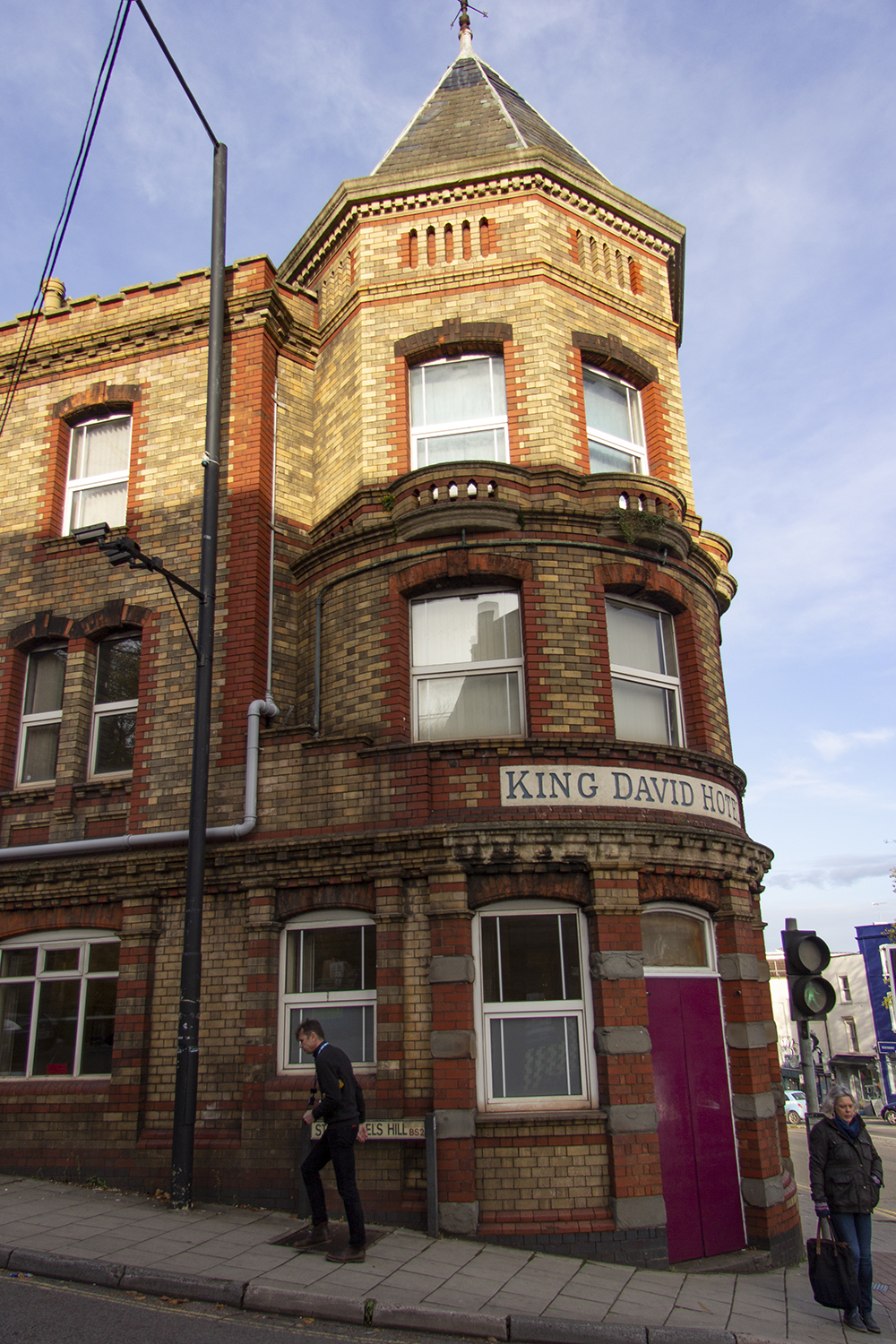
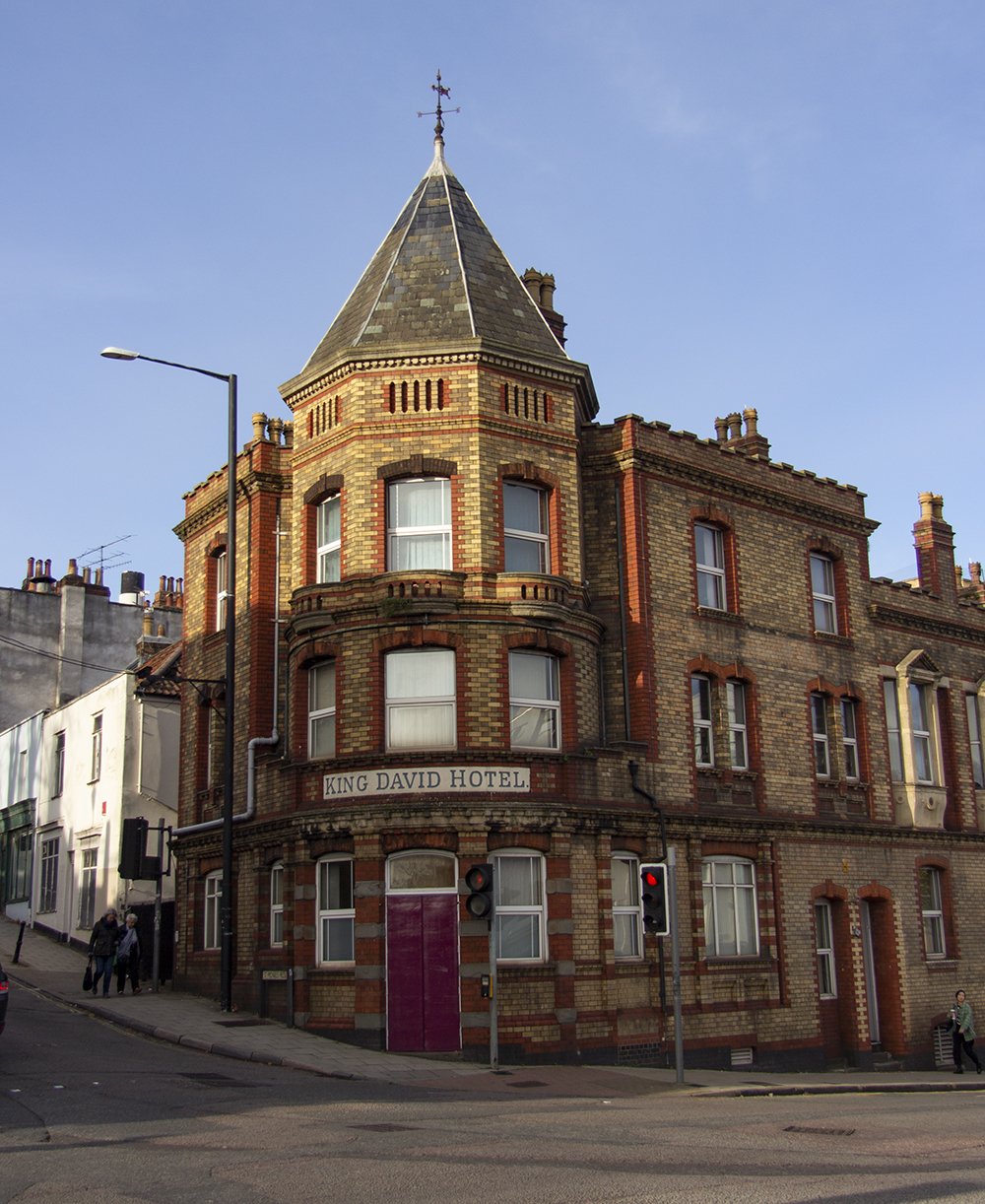
Managers and demolition — On Weds. 16 Sept. 1891 the brewing plant at the King David was sold at auction. That October plans were being made to rearrange the line of the street fronting where the Inn stood. A Mr. William T. West was landlord at this time, late Chief Steward of the S.S. Bonnie Doon and many years with Dunlop Mackie & Co., wine and spirit merchants. From the Western Daily Press - Monday 15 August 1892 page 5: "Antiquaries will observe with regret that a very notable "bit Old Bristol," the ancient portion the King David Inn, at the foot of St. Michael s Hill, is in process of demolition, to make room for a more modern structure. The part the building which is being polled down is several hundred years old. The workmen employed the undertaking have discovered several interesting articles, including a number of old bronze coins, and one silver coin." Around 1893 the King David was substantially rebuilt with club, meeting and auction rooms, luncheon bar, coffee and smoke rooms, sitting rooms and bedrooms. It was now managed by Walter Franklin, likely for Bristol United Breweries, Walter was manager of the Cliff Hotel, Cheddar by April 1896.
Robert Gibbons was born in Honey Cliff Farm, Batcombe, Somerset, in 1856, son of Benjamin Gibbons, a yeoman farmer, and wife Mary. He married his widowed sister-in-law Harriet Ann Gibbons nee Boyce on 12 Feb. 1885 at Clifton St. Andrew. Robert took the license of the King David from George Ingram at the sessions on Weds. 19 June 1895. George Ingram was the secretary and accountant of Bristol United Breweries, Lewin's Mead. Robert had been a farmer at Court Farm, Bitton, where he lived with Harriet in 1881, and later was licensed victualler at the Anchor Inn at Filton until 1895. Robert's nephew by his older brother James, Stephen George Gibbons, also lived with Robert and Harriet at the Anchor from at least 1891 and was an official tenant in 1895.
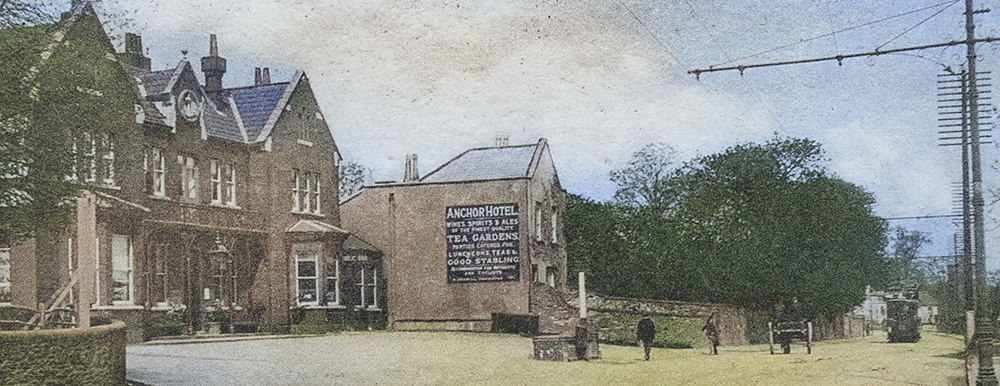
On Tuesday 21 Feb. 1899 the license for the King David was transferred from Robert Gibbons to Stephen George Gibbons. on Tues. 20 Feb. 1900 Stephen had his application for a music license refused. It was finally granted on Monday 4 April 1910.
Stephen George Gibbons was born at Holt Farm in Pilton, Somerset in 1872, baptised 19th March, son of James Gibbons and Harriet Ann Boyce. James had married Harriet on 9 Feb. 1869 in Batcombe. Unfortunately his father James died in 1875 aged 31, he was buried at Batcombe on 23 October. Stephen's mother Harriet later married James's younger brother Robert as detailed above. Stephen married Lucy, daughter of Filton laundry proprietor Samuel Shield on 16 August 1897 at St. Michael's, Bristol, he was assistant to his step-father Robert at the King David at the time of his marriage.
Stephen and Lucy had children Lucy Nora (b.10 Nov. 1898), Hartie Nellie (b. 6 Feb. 1901); Lillian Mary (b. 27 Oct. 1902); Pattie Georgina (b. 14 Jan. 1904-baptism missing); Jennie Boyce (b. 8 July 1905) all baptised at St. Michael's; Marjorie (bapt. 10 Nov 1907 at Filton St. Peter); George James (bapt. 20 Feb. 1910 at Filton St. Peter); Dorothy (bapt. 5 Nov. 1911 at Filton St. Peter) and Charlotte Myvile (bapt. 6 Sept. 1914 at Filton St. Peter). Lucy Nora died in 1907. Hartie Nellie married clerk Charles Percival Eastburn of Sea Mills on 20 May 1931.
On 1 Oct. 1923, Stephen's wife Lucy died at the hotel, aged 47. On Fri. 25 July 1930 Stephen's son was injured, along with his pillion passenger, when his motorcycle collided with a bus near Whitchurch, they were taken back to the hotel by the City and Marine Ambulance.
Stephen died on 28 April 1942, the executor of his will was Hartie Nellie Eastburn.
From the Western Daily Press - Friday 1 May 1942 page 3: "Death of Mr S. G. Gibbons. The death is announced of Mr Stephen George Gibbons, of the King David Hotel. Upper Maudlin Street, Bristol. Mr Gibbons, who was 70 years of age, was born at Pilton. Somerset, and came to the city in 1895. Mr Gibbons, who was a widower, was a keen cricketer, and was interested in Gloucestershire County Cricket Club. He was also a good chess player."
At the licensing session on Monday 1 June 1942 the licence for the King David, St. Michael's Hill (and music) was transferred to Hartie Nellie Eastburn from Stephen George Gibbons (deceased).
| Half Gallon Stoneware Flagon | 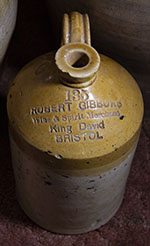 |
| Impressed:
135 / ROBERT GIBBONS / Wine & Spirit Merchant / King David /
BRISTOL Potter: Price Bristol |
| Half Gallon Stoneware Flagon | 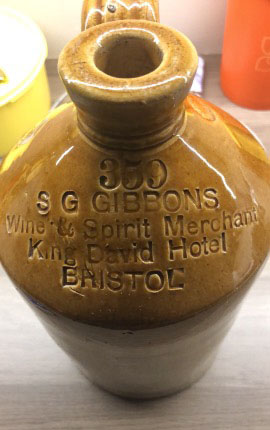 |
| Impressed:
359 / S. G. GIBBONS / Wine & Spirit Merchant / King David
Hotel / BRISTOL Potter: Price Bristol |